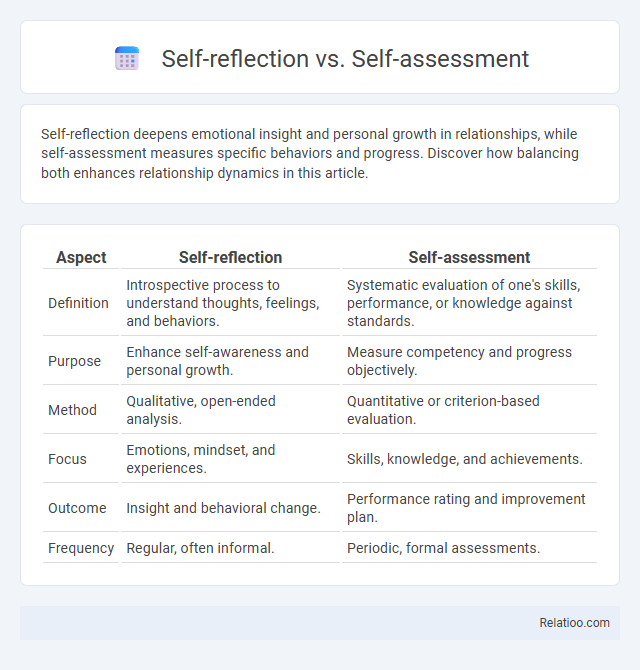Self-reflection deepens emotional insight and personal growth in relationships, while self-assessment measures specific behaviors and progress. Discover how balancing both enhances relationship dynamics in this article.
Table of Comparison
| Aspect | Self-reflection | Self-assessment |
|---|---|---|
| Definition | Introspective process to understand thoughts, feelings, and behaviors. | Systematic evaluation of one's skills, performance, or knowledge against standards. |
| Purpose | Enhance self-awareness and personal growth. | Measure competency and progress objectively. |
| Method | Qualitative, open-ended analysis. | Quantitative or criterion-based evaluation. |
| Focus | Emotions, mindset, and experiences. | Skills, knowledge, and achievements. |
| Outcome | Insight and behavioral change. | Performance rating and improvement plan. |
| Frequency | Regular, often informal. | Periodic, formal assessments. |
Understanding Self-Reflection: Definition and Purpose
Self-reflection involves a deep, introspective process where You examine your thoughts, emotions, and behaviors to gain personal insight and foster growth. It differs from self-assessment, which is a structured evaluation of performance against specific criteria, and from self-evaluation, which often combines aspects of both reflection and assessment. Understanding the purpose of self-reflection helps enhance self-awareness, improve decision-making, and support emotional intelligence development.
What is Self-Assessment? Key Concepts
Self-assessment is the process of evaluating one's own performance, skills, or knowledge against set criteria or standards, enabling individuals to identify strengths and areas for improvement. Key concepts include self-evaluation, goal setting, and feedback utilization, which foster personal growth, decision-making, and responsibility. Effective self-assessment involves honesty, critical thinking, and continuous monitoring to enhance learning outcomes and professional development.
Core Differences Between Self-Reflection and Self-Assessment
Self-reflection involves introspective examination of one's thoughts, emotions, and behaviors to gain deeper self-awareness, while self-assessment is a structured evaluation of skills, knowledge, or performance against predefined criteria or standards. Core differences between self-reflection and self-assessment lie in their purpose and approach: self-reflection is qualitative and subjective, focusing on personal growth and understanding, whereas self-assessment is quantitative and objective, designed to measure progress or competence. These distinctions highlight that self-reflection fosters mindful insight, whereas self-assessment provides measurable indicators for improvement.
Benefits of Practicing Self-Reflection
Practicing self-reflection enhances your emotional intelligence by allowing deeper understanding of personal thoughts, feelings, and behaviors, leading to improved decision-making and stress management. Unlike self-assessment or self-evaluation, self-reflection fosters ongoing personal growth through critical thinking and insight into past experiences. This continuous introspective practice builds resilience, self-awareness, and alignment with your core values, driving meaningful change and success.
Advantages of Engaging in Self-Assessment
Engaging in self-assessment enhances personal growth by providing objective insights into one's skills, strengths, and areas for improvement, fostering targeted goal-setting and skill development. It promotes accountability and self-awareness, enabling individuals to track progress and make informed decisions about their learning or professional journey. Regular self-assessment empowers continuous improvement, leading to greater confidence and effectiveness in both personal and professional contexts.
Techniques for Effective Self-Reflection
Techniques for effective self-reflection involve structured methods such as journaling, mindfulness meditation, and feedback analysis to gain deeper insights into your thoughts, emotions, and behaviors. Self-reflection focuses on personal growth by encouraging introspection, while self-assessment uses objective criteria to evaluate skills or performance, and self-monitoring tracks ongoing behaviors for real-time adjustments. Incorporating these techniques enhances your ability to critically evaluate experiences, leading to more informed decisions and continuous self-improvement.
Tools and Methods for Self-Assessment
Exploring tools and methods for self-assessment reveals a variety of techniques including structured quizzes, reflective journals, and competency checklists designed to measure skills objectively. Unlike self-reflection, which involves deep personal contemplation to gain insights, self-assessment utilizes specific instruments that help you evaluate your performance and progress against defined standards. Leveraging digital platforms and feedback surveys enhances accuracy and provides actionable data, supporting continuous personal and professional growth.
When to Use Self-Reflection vs Self-Assessment
Self-reflection is ideal when you want to understand your thoughts, emotions, and motivations on a deeper level, fostering personal growth and emotional intelligence. Self-assessment is best used when measuring your skills, performance, or progress against specific criteria or goals, enabling targeted improvement. You should choose self-reflection for insight into your inner experiences and self-assessment to evaluate tangible outcomes or competencies objectively.
Integrating Both Practices for Growth
Self-reflection involves examining personal thoughts and experiences to gain deeper self-awareness, while self-assessment focuses on evaluating one's skills and performance against set standards. Integrating both practices fosters holistic growth by combining introspective insights with objective evaluations, enabling targeted improvements and increased emotional intelligence. This balanced approach enhances personal development and professional effectiveness through continuous learning.
Common Pitfalls and How to Overcome Them
Common pitfalls in self-reflection, self-assessment, and self-monitoring include bias, lack of objectivity, and inconsistent evaluation criteria that compromise personal growth. You can overcome these challenges by setting clear, measurable goals, seeking external feedback, and practicing regular, structured reflection to enhance accuracy and accountability. Utilizing digital tools and journaling methods further supports consistent self-monitoring and meaningful progress tracking.

Infographic: Self-reflection vs Self-assessment
 relatioo.com
relatioo.com